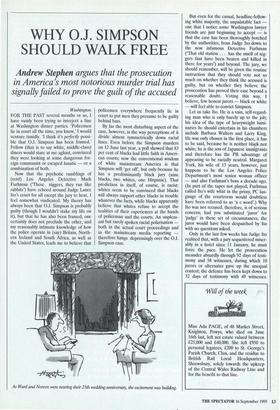WHY O.J. SIMPSON SHOULD WALK FREE
Andrew Stephen argues that the prosecution in America's most notorious murder trial has signally failed to prove the guilt of the accused
Washington FOR THE PAST several months or so, I have vainly been trying to interject a line at Washington dinner parties. 'Policemen lie in court all the time, you know,' I would venture timidly. 'I think it's perfectly possi- ble that O.J. Simpson has been framed.' Fellow (that is to say white, middle-class) diners would stare at me aghast, convinced they were looking at some dangerous for- eign communist or escaped lunatic — or a combination of both.
Now that the psychotic ramblings of (retd) Los Angeles Detective Mark Furhman (`These niggers, they run like rabbits') have echoed around Judge Lance Ito's court for all except the jury to hear, I feel somewhat vindicated. My theory has always been that O.J. Simpson is probably guilty (though I wouldn't stake my life on it), but that he has also been framed; one certainly does not preclude the other, and my reasonably intimate knowledge of how the police operate in (say) Britain, North- ern Ireland and South Africa, as well as the United States, leads me to believe that policemen everywhere frequently lie in court to put men they presume to be guilty behind bars.
By far the most disturbing aspect of the case, however, is the way perceptions of it divide almost symmetrically down racial lines. Even before the Simpson murders on 12 June last year, a poll showed that 83 per cent of blacks had little faith in Ameri- can courts; now the conventional wisdom of white mainstream America is that Simpson will 'get off, but only because he has a predominantly black jury (nine blacks, two whites, one Hispanic). That prediction in itself, of course, is racist: whites seem to be convinced that blacks will always support other blacks in trouble whatever the facts, while blacks apparently believe that whites refuse to accept the realities of their experiences at the hands of policeman and the courts. An unpleas- ant but rarely spoken racial polarisation both in the actual court proceedings and in the mainstream media reporting therefore hangs depressingly over the O.J. Simpson case.
As Ward and Noreen were nearing their 25th wedding anniversary, the excitement was building.
But even for the casual, headline-follow- ing white majority, the unpalatable fact one that I notice some Washington lawyer friends are just beginning to accept — is that the case has been thoroughly botched by the authorities, from Judge Ito down to the now infamous Detective Furhman (That old station . . . has the smell of nig- gers that have been beaten and killed in there for years') and beyond. The jury, we should remember, will be given the routine instruction that they should vote not so much on whether they think the accused is guilty, but on whether they believe the prosecution has proved their case beyond a reasonable doubt. Voting this way, I believe, few honest jurors — black or white — will feel able to convict Simpson.
Let us take Ito. He is a vain, self-regard- ing man who is only barely up to the job; his idea of the type of heavyweight lumi- naries he should entertain in his chambers include Barbara Walters and Larry King. He was only chosen in the first place, it has to be said, because he is neither black nor white; he is the son of Japanese immigrants and therefore has the PR advantage of appearing to be racially neutral. Margaret York, his wife of 13 years, however, just happens to be the Los Angeles Police Department's most senior woman officer — and also Furhman's boss a decade ago. (In part of the tapes not played, Furhman called Ito's wife what in the prissy, PC lan- guage of the courtroom would doubtless have been referred to as 'a c word'.) Why Ito was not recused, therefore, is of serious concern; had you substituted 'juror' for `judge' in these set of circumstances, the juror would have been despatched by Ito with no questions asked.
Only in the last few weeks has Judge Ito realised that, with a jury sequestered miser- ably in a hotel since 11 January, he must force the pace. He let the prosecution meander absurdly through 92 days of testi- mony and 58 witnesses, during which 10 jurors or alternates gave up the unequal contest; the defence has been kept down to 32 days of testimony with 49 witnesses.


































































 Previous page
Previous page